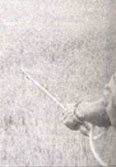DDT use endorsed
 Research indicates that there is still a place for that much maligned pesticide DDT, in controlling the Tse-tse fly, a vector in the debilitating disease trypanosomiasis -- the dreaded sleeping sickness.
Research indicates that there is still a place for that much maligned pesticide DDT, in controlling the Tse-tse fly, a vector in the debilitating disease trypanosomiasis -- the dreaded sleeping sickness.
Scientists from Britain's Natural Resources Institute, who studied the impact of DDT in Zimbabwe, found that the pesticide had a severe impact on a largescale on 4 bird species, particularly the blackchat and the wood-hoopoe, and 1 lizard species. It was found to have little effect on fish and on soil fertility.
Sleeping sickness leads to a drop in energy and a gradual wasting away and even death, if left untreated. It has the same effect on livestock and is particularly severe in cattle.
Related Content
- Analysis of the implications of Africa's food systems development on environmental sustainability
- Regional overview of food security and nutrition in Europe and Central Asia 2023: statistics and trends
- Global mapping report on multisectoral actions to strengthen the prevention and control of noncommunicable diseases and mental health conditions: experiences from around the world
- Report of the Joint Committee on the Forest (Conservation) Amendment Bill, 2023
- A global climate alliance to accelerate climate action: proposals to the G20
- Shine a (night)light: decentralisation and economic development in Burkina Faso
